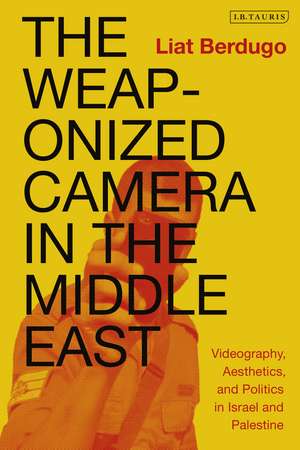The Weaponized Camera in the Middle East: Videography, Aesthetics, and Politics in Israel and Palestine
Autor Liat Berdugoen Limba Engleză Paperback – 21 sep 2022
| Toate formatele și edițiile | Preț | Express |
|---|---|---|
| Paperback (1) | 181.20 lei 3-5 săpt. | |
| Bloomsbury Publishing – 21 sep 2022 | 181.20 lei 3-5 săpt. | |
| Hardback (1) | 570.18 lei 6-8 săpt. | |
| Bloomsbury Publishing – 27 ian 2021 | 570.18 lei 6-8 săpt. |
Preț: 181.20 lei
Preț vechi: 233.80 lei
-22% Nou
Puncte Express: 272
Preț estimativ în valută:
34.68€ • 37.65$ • 29.13£
34.68€ • 37.65$ • 29.13£
Carte disponibilă
Livrare economică 01-15 aprilie
Preluare comenzi: 021 569.72.76
Specificații
ISBN-13: 9780755637454
ISBN-10: 0755637453
Pagini: 272
Ilustrații: 65 bw illus. 32 colour in plates
Dimensiuni: 156 x 234 x 18 mm
Greutate: 0.47 kg
Editura: Bloomsbury Publishing
Colecția I.B.Tauris
Locul publicării:London, United Kingdom
ISBN-10: 0755637453
Pagini: 272
Ilustrații: 65 bw illus. 32 colour in plates
Dimensiuni: 156 x 234 x 18 mm
Greutate: 0.47 kg
Editura: Bloomsbury Publishing
Colecția I.B.Tauris
Locul publicării:London, United Kingdom
Caracteristici
An interdisciplinary work that bridges communications, media studies, visual studies, photographic theory, politics, conflict studies and philosophy and provides a careful nuanced study of a region
Notă biografică
Liat Berdugo is Assistant Professor in Art and Architecture at the University of San Francisco. She is also an artist, writer and curator and has exhibited in galleries and festivals nationally and internationally. Her work has won several awards, including fellowships at the Hambidge Center, the Vermont Studio center, and a year-long residency in Tel Aviv, Israel, through the Dorot Foundation.
Cuprins
List of FiguresAcknowledgementsIntroduction1. Camera as a Revelatory Tool of Exposure2. Camera as Shame-Producer3. Camera as Mirror4. Camera as Shield5. Camera as Evidence6. Camera as WeaponClosingWordsReferencesNoteIndex
Recenzii
Engaging and accessible.
"After viewing thousands of hours of citizen-made video from the B'Tselem Camera Project archive, Liat Berdugo has written a complex and moving study of the Palestinian struggle for visibility and self-representation in the face of overwhelming Israeli military and media domination. Through a series of case studies, the book analyzes the different ways the video camera has been used by Palestinians and other media activists to counter the visual dominance of the Israeli regime. Meticulously researched and theoretically informed, it adds significantly to the study of grassroots activist media practices and the counter-tactics of visual representation when the camera has become weaponized."
Berdugo's entrance into the B'Tselem audio-visual archive is a passage into a thick forest of gazes, lenses and bullets, where vision is often impaired, and darkness prevails. But from this obscure night, Berdugo brilliantly proposes a taxonomy of cameras that illuminates new ways out of the political impasse that renders the violence in Israel-Palestine both spectacularly visible and systematically concealed. Extracting moments and fragments from the B'Tselem archive, Berdugo exposes yet another 'order of things', wherein cameras emancipate and shield inasmuch as they are wielded as weapons.
"After viewing thousands of hours of citizen-made video from the B'Tselem Camera Project archive, Liat Berdugo has written a complex and moving study of the Palestinian struggle for visibility and self-representation in the face of overwhelming Israeli military and media domination. Through a series of case studies, the book analyzes the different ways the video camera has been used by Palestinians and other media activists to counter the visual dominance of the Israeli regime. Meticulously researched and theoretically informed, it adds significantly to the study of grassroots activist media practices and the counter-tactics of visual representation when the camera has become weaponized."
Berdugo's entrance into the B'Tselem audio-visual archive is a passage into a thick forest of gazes, lenses and bullets, where vision is often impaired, and darkness prevails. But from this obscure night, Berdugo brilliantly proposes a taxonomy of cameras that illuminates new ways out of the political impasse that renders the violence in Israel-Palestine both spectacularly visible and systematically concealed. Extracting moments and fragments from the B'Tselem archive, Berdugo exposes yet another 'order of things', wherein cameras emancipate and shield inasmuch as they are wielded as weapons.
